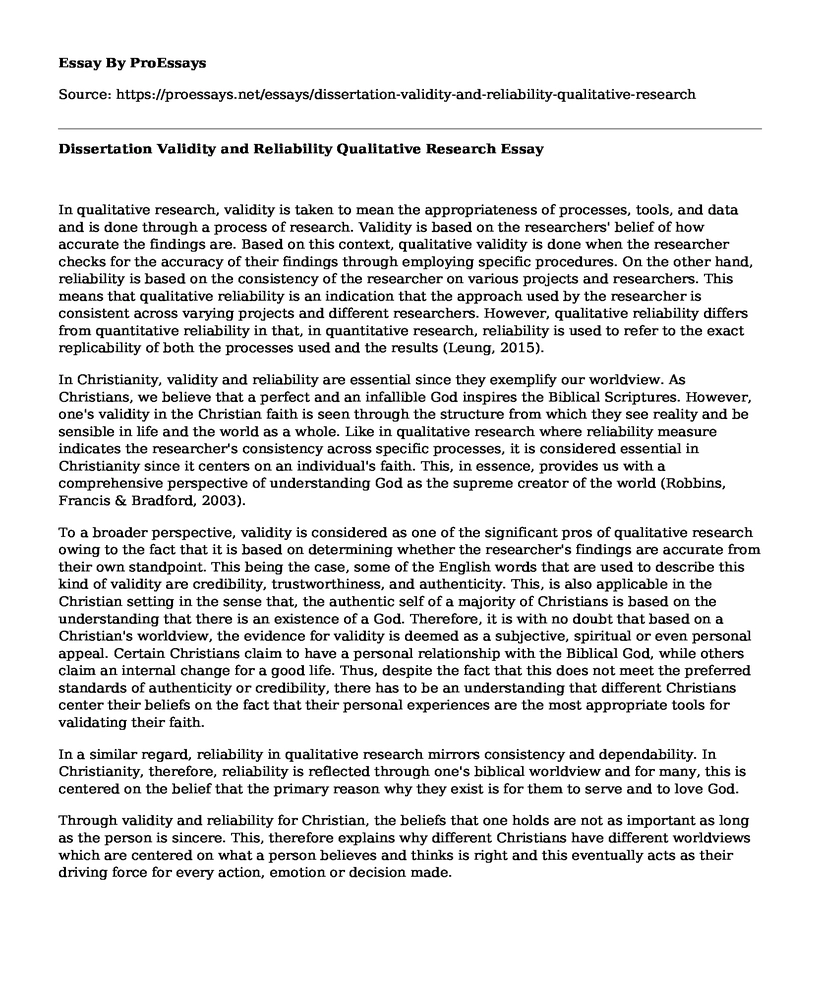In qualitative research, validity is taken to mean the appropriateness of processes, tools, and data and is done through a process of research. Validity is based on the researchers' belief of how accurate the findings are. Based on this context, qualitative validity is done when the researcher checks for the accuracy of their findings through employing specific procedures. On the other hand, reliability is based on the consistency of the researcher on various projects and researchers. This means that qualitative reliability is an indication that the approach used by the researcher is consistent across varying projects and different researchers. However, qualitative reliability differs from quantitative reliability in that, in quantitative research, reliability is used to refer to the exact replicability of both the processes used and the results (Leung, 2015).
In Christianity, validity and reliability are essential since they exemplify our worldview. As Christians, we believe that a perfect and an infallible God inspires the Biblical Scriptures. However, one's validity in the Christian faith is seen through the structure from which they see reality and be sensible in life and the world as a whole. Like in qualitative research where reliability measure indicates the researcher's consistency across specific processes, it is considered essential in Christianity since it centers on an individual's faith. This, in essence, provides us with a comprehensive perspective of understanding God as the supreme creator of the world (Robbins, Francis & Bradford, 2003).
To a broader perspective, validity is considered as one of the significant pros of qualitative research owing to the fact that it is based on determining whether the researcher's findings are accurate from their own standpoint. This being the case, some of the English words that are used to describe this kind of validity are credibility, trustworthiness, and authenticity. This, is also applicable in the Christian setting in the sense that, the authentic self of a majority of Christians is based on the understanding that there is an existence of a God. Therefore, it is with no doubt that based on a Christian's worldview, the evidence for validity is deemed as a subjective, spiritual or even personal appeal. Certain Christians claim to have a personal relationship with the Biblical God, while others claim an internal change for a good life. Thus, despite the fact that this does not meet the preferred standards of authenticity or credibility, there has to be an understanding that different Christians center their beliefs on the fact that their personal experiences are the most appropriate tools for validating their faith.
In a similar regard, reliability in qualitative research mirrors consistency and dependability. In Christianity, therefore, reliability is reflected through one's biblical worldview and for many, this is centered on the belief that the primary reason why they exist is for them to serve and to love God.
Through validity and reliability for Christian, the beliefs that one holds are not as important as long as the person is sincere. This, therefore explains why different Christians have different worldviews which are centered on what a person believes and thinks is right and this eventually acts as their driving force for every action, emotion or decision made.
References
Leung, L. (2015). Validity, reliability, and generalizability in qualitative research. Journal of Family Medicine and Primary Care, 4(3), 324. doi:10.4103/2249-4863.161306
Robbins, M., Francis, L. J., & Bradford, A. (2003). Reliability and Construct Validity for Scale of Rejection of Christianity. Psychological Reports, 92(1), 65-66. doi:10.2466/pr0.2003.92.1.65
Cite this page
Dissertation Validity and Reliability Qualitative Research. (2022, Mar 29). Retrieved from https://proessays.net/essays/dissertation-validity-and-reliability-qualitative-research
If you are the original author of this essay and no longer wish to have it published on the ProEssays website, please click below to request its removal:
- Compare and Contrast Between Two Countries
- Marketing Research Paper Example: SWOT Analysis of Bridal Companies
- Qualitative Data and Research Phenomena Essay
- The Importance of Random Assignment Paper Example
- Essay Sample on Strategic Market Analysis
- Essay on Healthcare Practitioners: Data Analysis for Fall Prevention in Long-Term Care
- Report Example on Mixed Methods in Nursing: Exploring Chronic Pain Challenges







